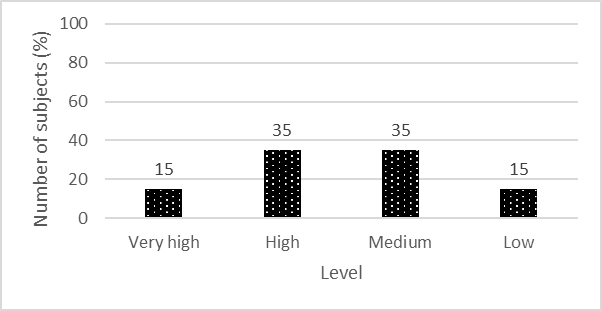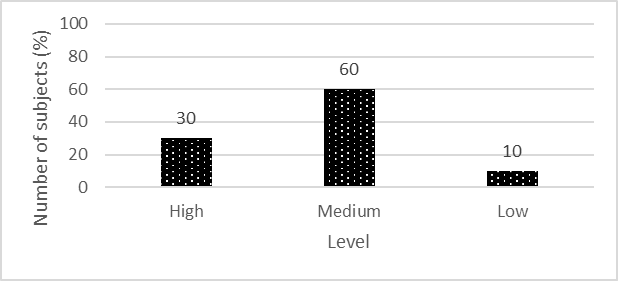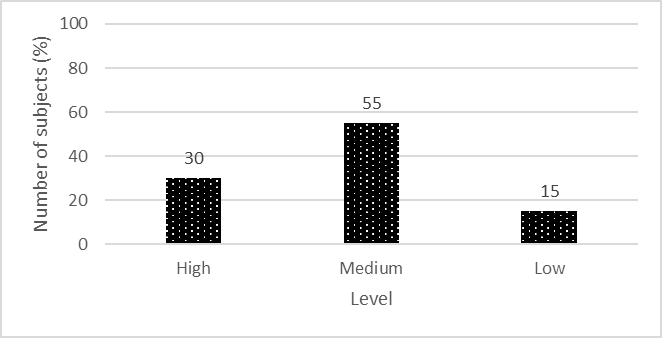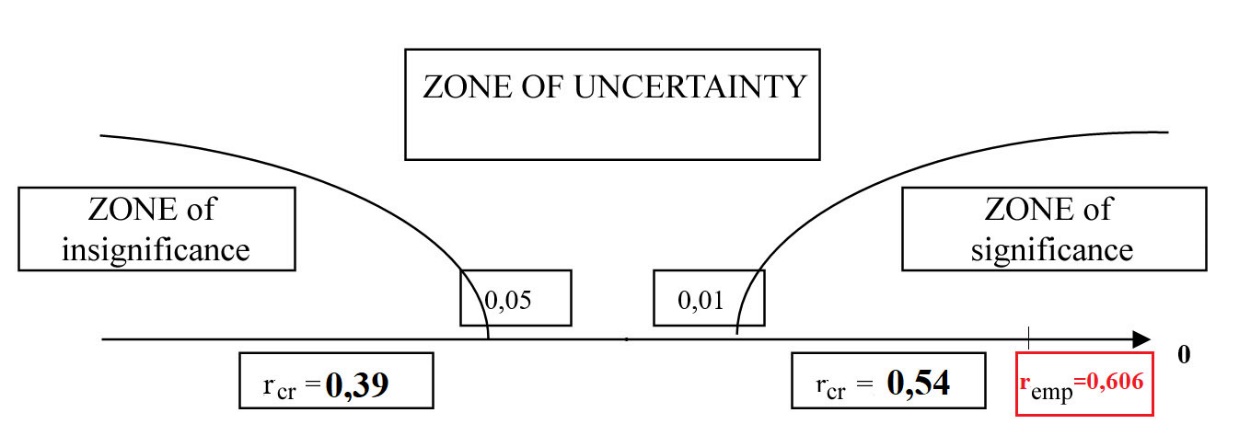Abstract
The problem of performance is extremely complex; its study involves many different approaches, but they are all grouped around two main aspects of the problem: how the teacher teaches; how a student studies and how his development is carried out. We assume that there is a relationship between the level of development of memory and the success of learning activities. Hence the goal of the study is to theoretically study and experimentally verify the relationship between memory properties and academic performance of college students. Research methods and techniques: theoretical: analysis, concretization, synthesis, generalization; empirical ascertaining experiment, testing by psychodiagnostic methods of R.S. Nemov: “Remember the numbers”, “Learn the words”, “Remember the drawings”. Spearman's correlation analysis was performed as methods of quantitative data processing. The research base was South Ural Institute of Arts name after P.I. Chaikovsky. The results obtained by the three methods indicate that most college students have high and medium memory properties. Using the Spearman rank correlation criterion, it was established that r emp falls into the zone of significance. The rank correlation coefficient is statistically significant and the rank correlation between the scores for the two tests is significant. Correlation has a positive direction, the correlation is direct, the coefficient is in the zone of significance, which means that the indicators of the memory properties and academic performance of college students are correlated. The hypothesis was confirmed: there is a relationship between the level of memory development and the success of educational activities.
Keywords: College studentsmemorytypes of memoryacademic performancecorrelation
Introduction
The process of education in a college is actualized in the light of the tasks of training highly qualified specialists ( Dolgova et al., 2019; Persky, 2018; Pollard & Courage, 2017). The effectiveness of solving these problems is due to many factors, including the targeted development of student memory ( Giofrè et al., 2013; Ghani & Gathercole, 2013; Lyaudis, 2011). At present, in science there is no unified theory of memory that could produce systemic modeling of innovative psychological and pedagogical technologies developing all types of memory; not fully understood is the functioning of memory, and its impact on the success of student learning.
Since memory is included in the whole diversity of human life and activity ( Gareau et al., 2019; Dolgova et al., 2019), the forms of its manifestation are extremely diverse. The following types of memory are classified:
by the time of preservation of the material (instant, short-term, operative, long-term);
by the analyzer prevailing in the processes of memorization, storage and reproduction of material (motor, visual, auditory, olfactory, tactile and other types of memory);
by the nature of goals, i.e. activities, the degree of volitional regulation of memory (involuntary and spontaneous);
by the object of memorization (figurative, verbal-logical, motor and emotional);
by source of information (genetic and lifetime);
by the method of memorization (mechanical, semantic, representational).
A distinctive feature of the memory of the age of late youth is its logical nature, which is mediated by thinking and is leading at the stage of late youth ( Garcia et al., 2011; Joh & Plakans, 2017; Knouse et al., 2014). This is a consequence of the fact that thinking itself dominates mental function during the maturation of a person ( Alloway et al., 2013; Fuhrmann et al., 2019; Ismarulyusda et al., 2012). In the period of late youth, all mental processes are considered through the prism of thinking. In childhood, memory is one of the main mental functions. In adulthood, during late adolescence, the emphasis is shifted, and thinking dominates.
Problem Statement
The problem is that currently in science there is no unified theory of memory that would be able to produce systemic modeling of innovative psychological and pedagogical technologies developing all types of memory; not fully understood is the functioning of memory, and its impact on the success of student learning.
Research Questions
Research questions are related to the search for theoretical premises and empirical relationships of memory and academic performance of a special group of students – college students.
Purpose of the Study
Theoretically study and experimentally verify the relationship between the properties of memory and academic performance of college students.
Research Methods
The study of the relationship of memory properties and academic performance among college students was implemented in three stages.
The first stage was search and preparatory. A theoretical analysis of the scientific literature on the study of the relationship between memory and academic performance among college students was carried out, the topic was clarified, a hypothesis was formulated, and an object and subject of study were selected.
The second stage was an experimental one. The indicators of the formation of memory properties and academic performance in college students were revealed.
The third stage was to control and generalize. A qualitative and quantitative analysis of the results was carried out; recommendations to students on the development of memory properties were given.
To test the hypothesis and solve the tasks, the following research methods were used: theoretical (analysis, specification, generalization), empirical (ascertaining experiment, testing), psychodiagnostic (“Remember the numbers”, “Learn the words” methodology, “Remember the pictures” ( Nemov, 2008)).
In the process of quantitative processing of the data obtained as a result of an empirical experiment, Spearman's correlation analysis was used.
Findings
The study was conducted in 2018 at the South Ural Institute of Arts. The experimental study involved 3 courses, with a total number of 20 people, including, 9 boys and 11 girls.
A group of subjects was diagnosed by the following methods: “Remember the numbers”, “Learn the words”, “Remember the drawings” ( Nemov, 2008).
According to the results of the method “Remember the numbers" ( Nemov, 2008), the following was revealed (Figure

15 % (3 people) of students have very high auditory memory. Students correctly reproduced 9 digits.
35 % (7 people) of the subjects were able to voice 8 numbers, which indicates high rates of auditory memory.
The average level of short-term auditory memory is illustrated by 35 % (7 people) of respondents. Learners identified 5–-7 words from the voiced.
The results of the study according to the method “Remember the drawings” ( Nemov, 2008) are shown in Figure

The analysis of the results by the method “Remember the drawings” ( Nemov, 2008) showed that 30 % (6 people) of the respondents showed high volumes of short-term visual memory. Students were able to remember and show 8 pictures out of 9.
The average level of short-term visual memory was shown by 60 % (12 people) of adolescents. The volume of short-term visual memory of these children was 4–7 units.
A low level of short-term visual memory was detected in 10 % (2 people) of the tested. The volume of their short-term visual memory is extremely low, amounting to 2–3 units.
The level of development of the memorization process was studied using the “Learn the Words” methodology ( Nemov, 2008) (Figure

Students enthusiastically performed this task; there was a noticeable interest in the results. An analysis of the results by the “Learn the Words” methodology ( Nemov, 2008) showed that 30 % (6 people) had a high level of memorization. They were able to memorize a series of words in the allotted time; 55 % (11 people) had an average level of the process of memorization. Groups of subjects were able to remember part of the words (from 6 to 9).
A low level of the process of memorization was detected in 15 % (3 people). Students often were able to remember from 4 to 5 words.
Students did not have questions during the course of their work. The instructions were clear the first time. In the process, it was found that in most cases, students memorize and reproduce a greater number of words during the first three auditions, which indicates a sufficient level of development of short-term memory. Starting from the fourth listening, the reproduction process becomes more difficult, the child makes mistakes by skipping previously learned words or replacing them with new ones.
Thus, the results of the study indicate that most college students have high and medium memory properties.
To establish the relationship of memory properties and academic performance of college students, we have chosen the average performance indicator over the last quarter.
School performance was as follows: 12 people with high academic performance (grades "4" and "5"); in 6 subjects the performance was average (mainly "3" and "4"); 2 students had low academic performance ("2" and "3").
We accept the following values (Figure
H0 – the correlation between the properties of memory and performance does not differ from zero;
Н1 – the correlation between the properties of memory and performance is different from zero.
After making the calculations, we received:

Figure
Conclusion
Based on the theoretical and empirical research, we can draw the following conclusions: memory is the phenomenon of the psyche, which is the process of remembering, preserving, organizing and reproducing a person’s experience.
The results obtained by the three methods indicate that most college students have high and medium memory properties. Using the Spearman rank correlation criterion, it was established that r emp falls into the zone of significance. The rank correlation coefficient is statistically significant and the rank correlation between the scores for the two tests is significant. Correlation has a positive direction, the correlation is direct, the coefficient is in the zone of significance, which means that the indicators of the properties of memory and academic performance of college students are correlated. High values of memory properties correspond to high values of academic performance of college students.
Acknowledgments
The research is conducted in the framework of the Scientific and Methodological Foundations of Psychology and Management Technology of Innovative Educational Processes in the Changing World project supervised by the South Ural research center of Russian Academy of Education in the South Ural State Humanitarian Pedagogical University. Grant from the Mordovia State Pedagogical Institute named after M.E. Evsevyev (2020; head Dolgova V.I.). The authors would like to express their gratitude to a postgraduate student of the Department of Psychology of the South Ural State Humanitarian Pedagogical University N.G. Akhmadeeva for conducting an ascertaining experiment under their supervision.
References
- Alloway, T. P., Bibile, V., & Lau, G. (2013). Computerized working memory training: Can it lead to gains in cognitive skills in students? Comput. in Human Behavior, 29(3), 632–638.
- Dolgova, V. I., Belikov, V. A., & Kozhevnikov, M. V. (2019). Partnership as a Factor in the Effectiveness of Practice-Oriented Education of Students. Int. J. of ed. and pract., 7(2), 78–87.
- Dolgova, V., Rokitskaya, Ju., Bogachev, A., & Nurmiev, G. (2019). Characteristic aspects of professional self-determination in students of pedagogical college. Advan. in Econ., Busin. and Managem. Res., 90, 14–16.
- Fuhrmann, D., Casey, C.S., Speekenbrink, M., Blakemore, S-Ja. (2019). Social Exclusion Affects Working Memory Performance in Young Adolescent Girls. Developm. Cognit. Neuroscience, In press, J. pre-proof, 100718.
- Garcia, L., Nussbaum, M., & Preiss, D. D. (2011). Is the use of information and communication technology related to performance in working memory tasks? Evidence from seventh-grade students. Comput. & Ed., 57(3), 2068–2076.
- Gareau, A., Gaudreau, P., & Boileau, L. (2019). Past academic achievement contributes to university students' autonomous motivation (AM) which is later moderated by implicit motivation and working memory: A Bayesian replication of the explicit-implicit model of AM. Learn. and Individual Differences, 73, 30–41.
- Ghani, K. A., & Gathercole, S. E. (2013). Working Memory and Study Skills: A Comparison between Dyslexic and Non-dyslexic Adult Learnersю Procedia – Soc. and Behavioral Sci., 97(6), 271–277.
- Giofrè, D., Mammarella, I. C., Ronconi, L., Cornoldi, C. (2013). Visuospatial working memory in intuitive geometry, and in academic achievement in geometry. Learn. and Individual Differences, 23, 114–122.
- Ismarulyusda, I., Nurul, F. J., Syarif, H. L., Nur, Z. M. S., & Nihayah, M. (2012). The Study of Working Memory and Academic Performance of Faculty of Health Sciences. Procedia – Soc. and Behavioral Sci., 60, 596–601.
- Joh, J., & Plakans, L. (2017). Working memory in L2 reading comprehension: The influence of prior knowledge. System, 70, 107–120.
- Knouse, L. E., Feldman, G., & Blevins, E. J. (2014). Executive functioning difficulties as predictors of academic performance: Examining the role of grade goals. Learn. and Individual Differences, 36, 19–26.
- Lyaudis, V. Ya. (2011). Memory is in the process of development. MPSI.
- Nemov, R. S. (2008). General psychology. Peter.
- Persky, A.M. (2018). A four year longitudinal study of student learning strategies. Currents in Pharmacy Teach. and Learn., 10(11), 1496–1500.
- Pollard, M. A., & Courage, M. L. (2017). Working memory capacity predicts effective multitasking. Comput. in Human Behavior, 76, 450–462.
Copyright information

This work is licensed under a Creative Commons Attribution-NonCommercial-NoDerivatives 4.0 International License.
About this article
Publication Date
31 October 2020
Article Doi
eBook ISBN
978-1-80296-091-4
Publisher
European Publisher
Volume
92
Print ISBN (optional)
-
Edition Number
1st Edition
Pages
1-3929
Subjects
Sociolinguistics, linguistics, semantics, discourse analysis, translation, interpretation
Cite this article as:
Dolgova, V., Golieva, G., Kondratieva, O., Kapitanets, E., & Shayakhmetova, V. (2020). Studying The Relationship Of Memory Properties And Performance Of College Students. In D. K. Bataev (Ed.), Social and Cultural Transformations in the Context of Modern Globalism» Dedicated to the 80th Anniversary of Turkayev Hassan Vakhitovich, vol 92. European Proceedings of Social and Behavioural Sciences (pp. 1631-1637). European Publisher. https://doi.org/10.15405/epsbs.2020.10.05.215

